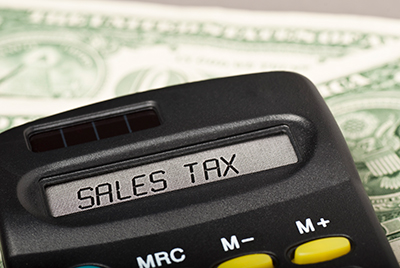Navigating the Complex World of Sales Tax Compliance
James A. Bartek, CPA, and Bonnie Susmano, J.D., MBA, Withum –
January 4, 2024

There are many reasons that sales and use taxes are among the most complex taxes for companies to manage correctly.
NEXUS
First, companies must determine where they have established nexus or a physical or economic connection to a state. For many years, a company was required to have a physical presence in a state to be subject to its sales tax. A physical presence includes, but is not limited to, an office, inventory or employee. However, in South Dakota v. Wayfair (2018), the Supreme Court held that a remote seller that established a market in a state by exceeding a specific dollar amount of sales and/or number of transactions could be required to register, collect and remit sales tax regardless of whether they were physically present in the state. Naturally, every state enacted its own economic nexus dollar threshold and/or number of transactions thre-shold to require remote sellers to collect tax. As of Jan. 1, 2023, every state that imposes a sales tax had enacted an economic nexus law.
Taxability
Once a company has established physical or economic nexus with a state, it must determine the taxability of its goods and services sold there. Researching the taxability of a good or service in one state or multiple states is complicated, regardless of how sophisticated the company may be. Since each jurisdiction can implement its own sales tax laws, sales taxes on products and services could differ in various states. Some products or services could be taxable in one jurisdiction butnot another. Further, taxability decisions become even more complicated when taxable and non-taxable products or services are sold for one non-itemized price (i.e., bundled transaction).
Rates and Compliance
Once a company has nexus in a state and has analyzed its goods’ or services’ taxability, it must apply the correct sales tax rate on the customer invoice. While this may sound simple, each state has its own state and/or local sales tax rates, adding up to more than 10,000 different rates across the United States. State or local sales tax rates can change anytime, making it much more difficult for companies to comply. Once the sales tax is collected, it must promptly be remitted to the appropriate jurisdiction. In addition, use tax should be accrued and remitted on taxable purchases where sales tax was not collected.
Strategies for Efficiency
If a company incorrectly reports its sales tax, it could expose itself to hefty interest, penalties and administrative burdens. The good news is that there are ways to manage the sales tax process efficiently. While many businesses still need a dedicated tax team, there are several options to assist companies with staying compliant while minimizing the administrative burden.
Implementing sales tax software can reduce the time spent on compliance and minimize the risk of errors. Many software providers can integrate with a company’s billing or e-commerce platform. Most vendors have an exemption certificate management feature to help companies validate and track exemptions accurately to reduce audit exposures. However, suppose these software programs are not implemented correctly. In that case, the company may create exposure by charging the wrong tax rate or incorrectly coding the taxability of goods or services in the software system.
Due to the changing state and local tax laws and guidance, businesses should stay current by attending sales tax webinars and training sessions and by reviewing key updates from qualified sources. Companies must periodically monitor physical and economic nexus thresholds to remain in compliance. Furthermore, businesses must maintain sufficient records — including exemption certificates, sales transactions, expense reports and tax filings — to defend tax audits.
If a business has resource limitations, a cost-effective solution could include outsourcing sales tax compliance to a qualified third-party provider. Outsourcing could include nexus and taxability reviews, filings, registrations, monthly reconciliations and audit defense.
Although sales tax compliance is complex, businesses can effectively navigate the challenges with the right people, processes and technology. Keeping current with the changing tax laws, utilizing software and outsourcing essential functions can help businesses reduce the administrative costs and risks associated with sales tax compliance. Companies can also often save money and compliance-related headaches by consulting with qualified sales tax professionals specializing in sales and use tax.
 | Bonnie SusmanoBonnie Susmano, J.D., MBA, is a senior manager at Withum. She can be reached at bsusmano@withum.com. |
 | James A. BartekJames A. Bartek, CPA, is a partner in the State and Local Tax department at Withum. He is a member of the NJCPA and can be reached at jbartek@withum.com. |
This article appeared in the winter 2023/24 issue of New Jersey CPA magazine. Read the full issue.